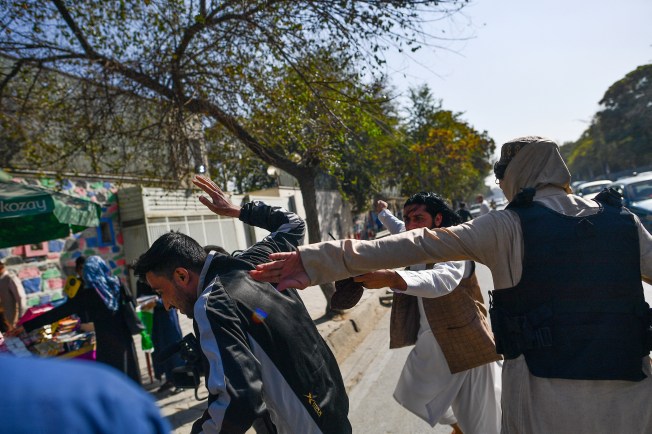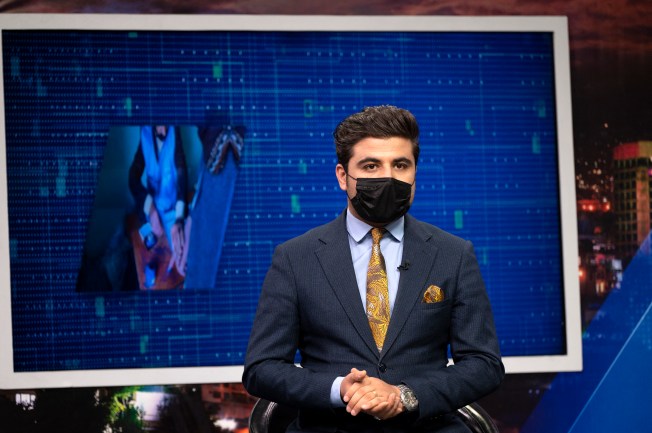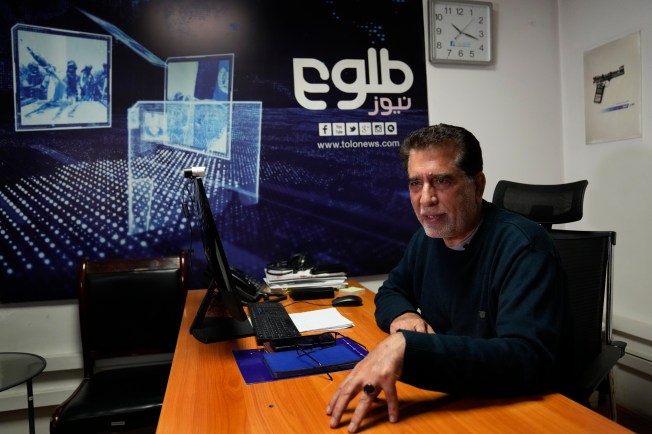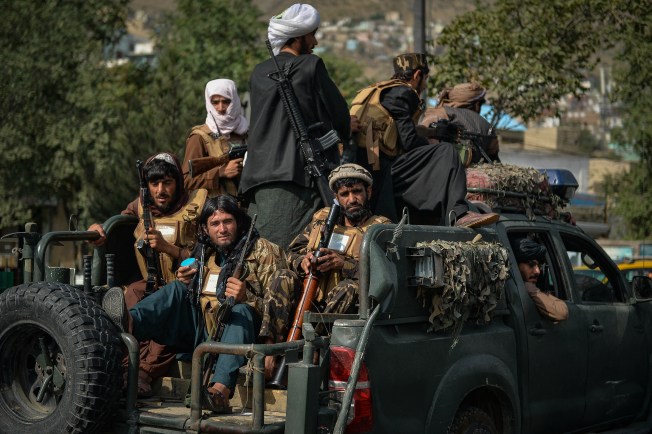Twelve months after the Taliban takeover, many Afghan journalists are out of work or on the run. Others try, very carefully, to challenge the powerful.
The extreme distress that has gripped Afghanistan’s independent media since the Taliban seized power in Kabul on August 15 last year lands in my inbox—and the inboxes of many of my colleagues at the Committee to Protect Journalists (CPJ)—almost every day.
The messages come from journalists who just a year ago worked for Afghanistan’s then-thriving, free-wheeling newspaper or broadcast outlets. Some journalists write with stories of detention and beatings by the Taliban. Some detail their own destitution. Many, desperate to leave Afghanistan, appeal for help. Still other journalists write to say they made it out of the country, but are stuck on temporary visas in places like Pakistan or Turkey. Running short of money and often unable to get onward visas—the U.S. government is rejecting more than 90% of Afghans seeking to enter the country on humanitarian grounds—they’re fearful of being sent home to an uncertain fate.
Such pleas are just one measure of the crisis that has hit Afghanistan’s diverse independent media since the Taliban took back control of Afghanistan amid the withdrawal of U.S. forces last year. They also document, however, the perseverance and determination of journalists who understand the importance of reporting fact-based stories. Many of the country’s journalists remain determined to carry on—from both inside and outside of the country—in the hope that Afghanistan’s independent media will continue to play a vital role.

As detailed in this series of articles CPJ is publishing on the one-year anniversary of the Taliban takeover, the challenges Afghan journalists face are severe, ranging from physical abuse and censorship to particular constraints placed on women. But some journalists also see glints of opportunity. The war that for so long devastated the country—and made so many regions no-go zones—is over, at least for now. There are fresh stories to tell, and a new regime that needs to be held accountable.
Perilous work
Afghanistan’s free media was a rare success story of the former regime, but even then, journalism was perilous work. Rival parties—including government intelligence agents, the Taliban, and the Islamic State—often targeted reporters. “In the year or year-and-a-half before the Taliban takeover, it was especially dangerous for journalists,” says Kathy Gannon, who reported on Afghanistan for more than three decades for The Associated Press.“You didn’t know who was targeting who, and they would blame each other.”
It remains a mystery, for example, which group was behind the 2020 murder of Rahmatullah Nikzad, a freelance journalist who contributed to international outlets, or who planted the car bomb that killed 23-year-old, female news presenter Mina Khairi of Ariana News in June 2021.
One year later
CPJ/Esha Sarai
From 2001 until today, some 53 journalists have been killed in Afghanistan in connection with their work; of those, 27 were murdered, meaning intentionally targeted, according to CPJ data. And of the 27 murdered, prosecutors obtained convictions in the cases of just four journalists killed in 2001.
Because of that dismal record, Afghanistan ranked 5th in CPJ’s most recent impunity index, which gauges the worst countries for seeking justice when journalists are murdered. Since the Taliban mid-August takeover, CPJ, thankfully, has not documented any further assassinations of journalists by Taliban, at least so far. But dangers still abound. A recent UN report found that six journalists had died between August 15, 2021, and June 15, 2022. According to the report, five were killed by self-identified members of Islamic State in Iraq and the Levant – Khorasan Province; one by unknown perpetrators. (CPJ has not found evidence that their deaths were related to their work as journalists.)
Disturbing trends
Surveys conducted under difficult circumstances and published during the past year differ in specifics, but show very disturbing trends: Huge declines in the numbers of newspapers, radio stations, and other news sources, as well as a collapse in the number of women journalists.
Fear has spurred some of this downturn. The Taliban has imposed pressure, sometimes violently, on news outlets to conform to its fundamentalist ideology. Taliban fighters, for instance, detained and severely beat reporters from Etilaatroz newspaper who were covering a street protest in September 2021, as CPJ has reported. The Taliban also visited the newspaper’s office and warned them against using critical language or unacceptable terms—for example, saying “Taliban group” instead of their preferred name, “Islamic Emirate of Afghanistan.”
“You have to be on the Taliban side or they will close your office,” Etilaatroz online editor Elyas Nawandish told an international journalism festival in April. Some Etilaatroz staff quit, and much of the remaining staff is now spread among Albania, Spain, and the United States. Those still in Afghanistan are working underground, Nawandish says, but Etilaatroz is trying to help them leave.
The Taliban’s arrival led Etilaatroz, which specializes in investigative reporting, to stop printing and move exclusively online. The company had lost the advertising and subscription fees needed to sustain its print operations.
Indeed, the extreme downturn in Afghanistan’s economy has robbed all media properties of advertising and other sources of income. “It’s beyond catastrophic,” Saad Mohseni, CEO of the Moby Group, which owns and operates Afghanistan’s largest news and entertainment network, TOLONews and TOLO TV, said of the decline in Afghanistan’s economy.
More on Afghanistan’s media crisis
- Report: CPJ’s 2022 Afghanistan’s media crisis
- CPJ’s recommendations for protecting journalists and press freedom in Afghanistan
- Inside an Afghan news network’s struggle to survive
- Video: One year later
- Keeping hope alive
- Video: Journalists in exile
- ‘I thought about the efforts and struggles of two decades… and cried.’
- Opinion: Courageous journalism is happening in Afghanistan. How we can help.
- Video: Women journalists under pressure
- Press release
- Download a PDF of this report
Prior to the Taliban takeover, foreign assistance amounted to about 45% of the economy, according to the World Bank, and roughly 75% of government expenditures. Those foreign inflows came to an abrupt halt last August. At the same time, U.S. President Joe Biden issued an executive order to take $7 billion of frozen Afghan funds from the country’s central bank and designate half for humanitarian aid for Afghanistan, while airlifting some 130,000 often well-educated Afghans out of the country in just two weeks.
While the outright killing of journalists by the Taliban may have stopped, CPJ has documented a steady stream of Taliban-perpetrated incidents aimed at intimidating and punishing reporters and editors, including arbitrary detention and beatings, sometimes severe. Although the Taliban’s Ministry of Information and Culture initially seemed to take the lead in managing the media, CPJ has documented that the General Directorate of Intelligence (GDI) has increasingly come to play a leading role.

Other trendlines are also moving in a worrisome direction. In April, a Taliban military court in Herat sentenced journalist Khalid Qaderi to a year in prison for allegedly spreading anti-regime propaganda and “committing espionage for foreign media outlets.” It was the first incident that CPJ has documented of a journalist being tried, convicted, and sentenced for their work since the Taliban takeover. According to the recent UN report, 163 of 173 human rights violations affecting journalists and media workers in the first 10 months of the Taliban’s return to power were attributed to “the de facto authorities.” These included 122 instances of arbitrary arrest and detention, 58 instances of ill-treatment, 33 instances of threats and intimidation, and 12 instances of incommunicado detention.
Gauging limits
Journalists who keep working have to do so with great caution. For better and worse, however, that isn’t completely new to them. Ali Latifi, an experienced reporter and dual U.S.-Afghan citizen who contributes to international media, says there’s always been an element of caution in reporting on Afghanistan. Reporters routinely had to weigh the risks of retaliation, particularly when reporting on sensitive subjects. Those pressures are just more severe today.
“How much are you going to say online?” says Latifi. “Is a statement you make online valuable enough to take the risk of getting you in trouble?”

Taliban have stopped and questioned Latifi, but he cooperated and says he didn’t face trouble. Some stories, however—such as covering protests by women—provoke an immediate backlash. “People are trying to figure out the lines—what you can do [and what you can’t do],” he says. Out of a general sense of caution, Latifi has started taking more care to protect sources.
Gannon says that for her, reporting in Afghanistan didn’t change significantly from what she faced under the previous government—although she recognizes that local journalists come under more scrutiny, and can be subject to harsher repercussions. There’s one positive difference, she says: It’s safer to travel the roads of Afghanistan since the fighting has stopped.
Still, the road ahead for foreign journalists is far from open. “They are pretty thin-skinned about the image of them that is presented to the world,” says Lynne O’Donnell, an Australian journalist and columnist for Foreign Policy magazine, speaking of the Taliban. On July 19, O’Donnell, a veteran of Afghanistan reporting who had arrived in Kabul just days earlier, was detained by agents from the GDI and forced, under threat of imprisonment, to tweet an apology for earlier stories she had written about forced marriage to Taliban fighters. After posting a short text dictated by the Taliban, she was allowed to leave the country, and later vowed never to return. “It’s fear that is the basis of their power,” O’Donnell said of Taliban rule in an interview with CPJ. “They are becoming much more efficient in ensuring that people are afraid.”
Less provocative
Mohseni, an Afghan Australian based in Dubai, says that TOLO still broadcasts on controversial subjects. “Every single issue that we need to cover, we cover,” he says. “So whether it’s about extrajudicial killings, or the fighting in Panjshir; certainly girls’ education, targeting of minorities – every single thing that we need to cover, we’ve covered.” Mohseni adds, however, that TOLO’s broadcasts are intentionally less provocative than what the station produced under the previous government.

“Less provocative” may be coded language for “self-censorship,” an approach that allows many journalists around the world to continue reporting in environments that are hostile to press freedom by avoiding language and ideas that authorities find offensive. TOLO and other Afghan news outlets have had to make their own decisions about where the boundaries are, and how far to push them. That hasn’t always protected them.
Journalists and managers at the independently owned Ariana News network, for example, told CPJ of working under dire conditions in the year since the Taliban took back control of Afghanistan. Staff say the beatings, interrogations, harassment, censorship, and dismissal of female employees are emblematic of the difficulties faced by other Afghan media organizations—and that they have squeezed the formerly robust outlet to what they fear might be the brink of closure.
At TOLO, agents from the GDI arrived at the station on March 17 and took news presenter Bahram Aman, news manager Khapalwak Sapai, and the channel’s legal advisor into custody. “I said, why me?” Aman later told CPJ. “They told me that I am a spy and so on.”
Aman was held in isolation for a day in a dark room and released. The immediate issue, it turned out, was that the GDI objected to a news report saying the agency was behind a directive banning the broadcasting of foreign soap operas. According to Aman, the GDI had previously warned the station not to mention the agency in the news, but Aman just read the script handed to him that night. He also talked about the story of his detention on air after he was released, which led to further threats, he told CPJ. Aman added that the Taliban were angry at him because of previous shows where he’d aggressively questioned their representatives on air. He has since fled the country.
Still, TOLO appears to have faced relatively fewer issues, compared to Ariana. That may be because Mohseni is more amenable to working with the Taliban than his public statements suggest. “Tolo has tried to adjust to the new environment,” says Michael Kugelman, deputy director of the Asia program at the Wilson Center, a non-partisan think tank based in Washington, D.C. “They have not been going out of their way to criticize the Taliban.”
An experienced Afghan journalist, who requested anonymity so he could speak freely about Mohseni, said: “He’s doing whatever it takes to keep his channel going. He’s not a journalist. I think Saad [Mosheni] wants to be a player and he uses his media outlet to be that. Still, added the journalist, “I think their journalists are amazing and they want to tell the truth.”
Despite pressures to reduce the profile and role of women, TOLO has made a point of hiring more women, with 21 women journalists on the staff today compared to eight in August last year. When the Taliban in May forced women on-air to cover their faces below the eyes, male journalists at the station staged a protest by masking up for four days. While the move attracted conservative attacks on social media, the Taliban did not otherwise react to it, says Mohseni. In fact, while many TOLO staff fled the country in the immediate aftermath of the Taliban takeover, TOLO has continued to hire replacements, keeping staff levels at around 80.

“In many parts of the south, and districts and provinces where we could not go because of the violence, now we can go and we can report on local issues,” he says. “We’ve gone from 17 local stories to 22 to 25 a day. So we have a much bigger coverage in terms of the news than we did before.”
Mohseni says the station has stayed afloat because of a corporate decision to support the operations, not because it’s making money. Moby operates news and entertainment services in South and Central Asia, the Middle East, and Africa. He’s searching for other forms of financial backing to keep TOLO going.
Mohseni believes that news coverage of controversial issues, such as girls’ education, has played a key role in shaping public opinion, which he says the Taliban are sensitive to and which could, over time, strengthen moderate voices within the leadership. “There’s perhaps a narrow path to something positive emerging from all of this,” he says, while also recognizing that whatever limited freedoms are left could be shut down at any time.
For the journalists who flood my inbox with messages like “Please help me Mr. Butler,” or— referring to the Taliban—“They will assassinate me or a member of my family,” the future seems impossibly bleak. Yet many hundreds of journalists remain on the job in Afghanistan, navigating a dangerous new political landscape, while others try to report from exile. They believe their work can still make a difference in the future of their country and the lives of their fellow Afghans.
Steven Butler is a senior program consultant for CPJ. He previously served as CPJ’s Asia program coordinator and has worked as a journalist throughout Asia.
This content originally appeared on Committee to Protect Journalists and was authored by Steven Butler.
Steven Butler | Radio Free (2022-08-11T12:16:01+00:00) Afghanistan’s media faces crisis—and opportunity. Retrieved from https://www.radiofree.org/2022/08/11/afghanistans-media-faces-crisis-and-opportunity/
Please log in to upload a file.
There are no updates yet.
Click the Upload button above to add an update.